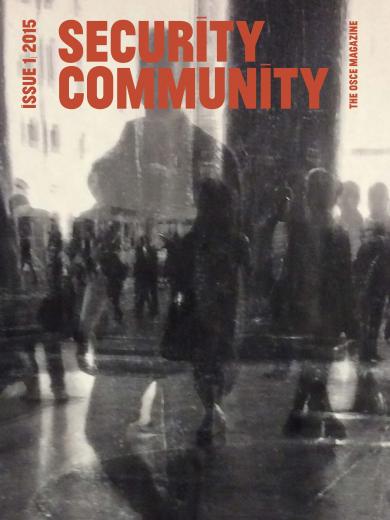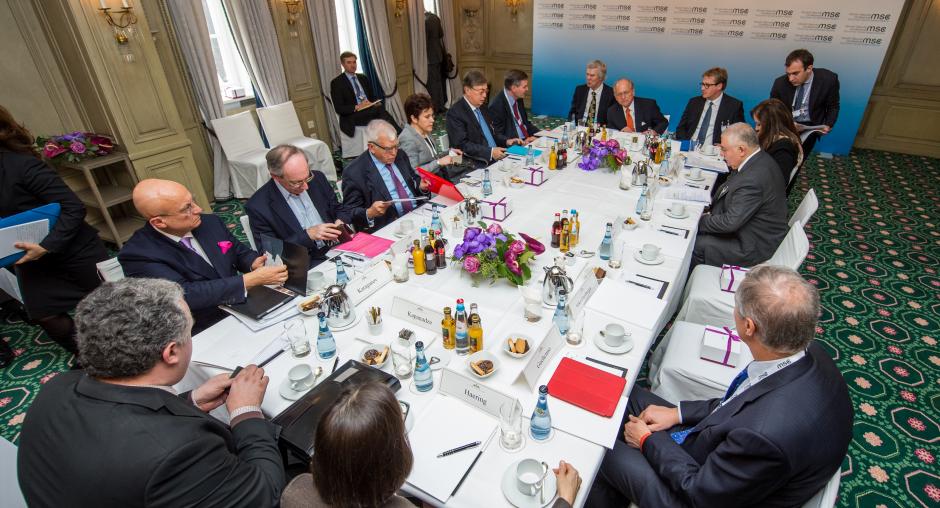Rethinking the OSCE and Security in Europe
Over the almost forty years of its existence, the Organization for Security and Co-operation in Europe (OSCE), known until 1994 as the Conference on Security and Co-operation in Europe (CSCE), has had to adapt to a constantly changing security environment. Reform efforts were often driven by paradigmatic changes in global and European security. The first attempt to comprehensively modernize the OSCE was made at the end of 2004. The OSCE Ministerial Council mandated a Panel of Eminent Persons to review the effectiveness of the Organization in a transforming Europe. “The old dividing lines of the Cold War no longer exist. As a consequence, the role of the OSCE, like other security organizations, is being adapted to this new security paradigm. (…) A rapidly evolving European and Eurasian landscape requires an organization like the OSCE to play a constructive role in preventing the emergence of new dividing lines,” the panellists wrote in their report. They provided recommendations for improving the collective action of the organization in addressing protracted conflicts and 21st century threats.
After the Russian-Georgian armed conflict in 2008, the OSCE, under the Greek Chairmanship, launched the Corfu Process, a series of informal discussions on ways to rebuild trust and confidence among the participating States. The Corfu Process culminated in the Astana Summit of 2010, at which the participating States recommitted themselves to “the vision of a security community stretching from Vancouver to Vladivostok, rooted in agreed principles, shared commitments and common goals”. However, a proposed “Framework for Action” that contained a catalogue of reform measures did not achieve consensus.
Following Astana, the reform agenda was pursued in the so-called V-to-V Dialogues under the 2011 Lithuanian Chairmanship, and, at the end of 2012, picked up by the Helsinki +40 process. This process aimed at reaffirming the Helsinki principles in all three OSCE dimensions – politico-military, economic and environmental, and human security – and strengthening the Organization’s ability to address current and future security challenges. It gained much visibility and raised high expectations under a joint work plan agreed by Switzerland and Serbia for their successive Chairmanships (2014 and 2015, respectively). Unfortunately, the crisis in and around Ukraine brought Helsinki +40 to a grinding halt.
That crisis plunged the OSCE also into an existential crisis, threatening its role as legitimate guardian of European security. It was under these circumstances that the then Chairperson-in-Office, Swiss Foreign Minister and President of the Confederation, Didier Burkhalter, launched the “Panel of Eminent Persons on European Security as a Common Project” at the Ministerial Council in Basel in December, 2014. The idea was to prepare the basis for an inclusive and constructive security dialogue across the Euro-Atlantic and Eurasian regions, taking into consideration the Ukraine crisis in its broader perspective as well as other developments in the OSCE area where participating States consider their security to be threatened. The Panel was tasked with reflecting on how to re-build trust and (re-)consolidate European security as a common project on the basis of the Helsinki Final Act and the Charter of Paris and on how to ensure effective adherence to OSCE principles. It is also examining perceived threats in the OSCE area and exploring common responses as well as possibilities to reconfirm, refine, reinvigorate and complement elements of co-operative security. Finally, it has been asked to analyse the particular role of the OSCE in Euro-Atlantic and Eurasian security and its role in preventing and resolving crises, including in Ukraine. The hope is that the Panel will be able to reenergize some components of the Helsinki +40 process, which will be a subject of the high-level meeting in Helsinki planned for July and could be beneficial also beyond the Belgrade Ministerial Council at the end of the year.
Chaired by Ambassador Wolfgang Ischinger, who heads the Munich Security Conference, the Panel is composed of 15 members from all OSCE regions. Its members serve in their individual capacities. The Panel will produce two reports. The first, an interim report, was presented in Vienna on 17 June. It focuses on lessons learned from the OSCE’s engagement in Ukraine. The second, a final report, will address the broader issues of security in the OSCE area. Both reports will contain practical recommendations and action points for policy makers, including the OSCE Ministerial Council and the OSCE participating States.
General guidance for the Panel’s work is provided by the OSCE Troika, composed of the outgoing Swiss, current Serbian and incoming German Chairmanships. The Panel is seeking input from the OSCE participating States, the OSCE Secretariat, Institutions and Parliamentary Assembly, multilateral organizations concerned with European security issues, civil society and think tanks. It does this by, for instance, holding hearings, commissioning papers and conducting visits. The Panel and individual members also make use of opportunities to engage with high-level representatives of participating States (for example in side events at multilateral conferences and other international events). The Panel is assisted by a support unit that provides operational and logistical assistance in convening meetings as well as substantive support in drafting the reports. The OSCE Network of Think Tanks and Academic Institutions is contributing research and position papers. The Panel is financed through voluntary contributions.
By Fred Tanner
Ambassador Fred Tanner is a Senior Adviser in the Office of the OSCE Secretary General. He is the OSCE Secretariat Project Manager of the Panel of Eminent Persons on European Security as a Common Project.
“Lessons learned for the OSCE from its engagement in Ukraine”, the interim report of the Panel of Eminent Persons, is available here: www.osce.org/networks/164561?download=true
Wolfgang Ischinger, Chairperson of the Panel of Eminent Persons on European Security as a Common Project, answers questions:
Why is this panel necessary?
None of the existing international fora – neither the Security Council of the United Nations, nor the NATO-Russia Council, nor the relationship that has existed for many years now between the European Union and the Russian Federation – none of these organizational or institutional arrangements has been able to provide a framework for finding a peaceful settlement to the conflict over eastern Ukraine, including the Crimea situation.
The idea of creating a reflection process which would allow all the parties to the conflict – the Russian Federation, Ukraine, the United States, frontlines states such as Poland, the Baltic States and others – to be represented in an informal effort to look for a way forward, to define ways to strengthen the European security architecture emerged at the end of last year and I found it to be an extremely good one.
The Panel of Eminent Persons will seek to offer a serious contribution to the reflection about what needs to be done to make sure that crises like the one we have had over the last 12 months in and around Ukraine will not happen again.
How has your experience of chairing national dialogue discussions in Ukraine on behalf of the OSCE last year prepared you for the role of chairing this panel?
My work on behalf of OSCE Chairperson-in-Office in the spring of last year gave me a firsthand insight into the situation both in Kyiv and the Donbas region. I was able to visit Donetsk and other communities before fighting made such visits impossible. This experience, coupled with my strong background as a crisis negotiator, is extremely useful in shaping the priorities of our panel.
What results do you expect the Panel to achieve?
The Panel has a double mandate. The first report provides recommendations for the OSCE specifically – and the second will address European security matters more generally, going beyond those directly related to the OSCE.
In the first report, we came up with recommendations that we hope will feed into the decisions of the Permanent Council of the OSCE: recommendations on how the OSCE can be better equipped to deal with such emergencies, and how to equip the OSCE with more political influence and power.
We learned a lesson in the Georgian conflict in 2008 and we learned a much bigger lesson this year in Ukraine. This panel therefore has to look at security in a new, serious manner: what happened to conventional arms control? What happened to trust in political relations? We need to create a European architecture characterized by transparency in military and political terms, by verifiability, by mutual transparency of information, by reduction of armaments.
2014 was a wake-up call for European security. The Panel is an opportunity to respond, to provide suggestions for how we can build a more resilient and inclusive Euro-Atlantic security community.
Panel Members
Wolfgang Ischinger, Germany, Chairperson of the Munich Security Conference
Dora Bakoyannis, Greece, Member of Greek Parliament, Former Minister of Foreign Affairs and the OSCE Chairperson-in-Office in 2009
Tahsin Burcuoğlu, Turkey, former Ambassador
Ivo H. Daalder, United States, former Ambassador, President of the Chicago Council on Global Affairs
Oleksandr Chalyi, Ukraine, President of Grant Thornton
Vaira Vike-Freiberga, Latvia, Former President of Latvia, President of the Club de Madrid
Jean-Marie Guéhenno, France, former United Nations Under Secretary-General, President of the International Crisis Group
Barbara Haering, Switzerland, former Member of Parliament, Director of the think tank econcept Inc.
Sergi Kapanadze, Georgia, former Deputy Foreign Minister, Director of the think tank Georgia’s Reforms Associates
Sergey A. Karaganov, Russian Federation, Honorary Chairman of the Presidium of the Council on Foreign and Defense Policy
Malcolm Rifkind, United Kingdom, former Foreign Secretary, Member of Parliament
Adam Daniel Rotfeld, Poland, former Foreign Minister, Professor at Warsaw University
Teija Tiilikainen, Finland, former State Secretary, Director of the Finnish Institute of International Affairs
Kassym-Jomart Tokayev, Kazakhstan, former Prime Minister, Chairman of the Senate
Ivo Visković, Serbia, former Ambassador, Professor of Political Sciences at the University of Belgrade
For more information, see www.osce.org/cio/133976
Welcome to Security Community
Security Community is the OSCE’s online space for expert analysis and personal perspectives on security issues.
The views expressed in the articles are those of the authors and do not necessarily reflect the official position of the OSCE and its participating States.


